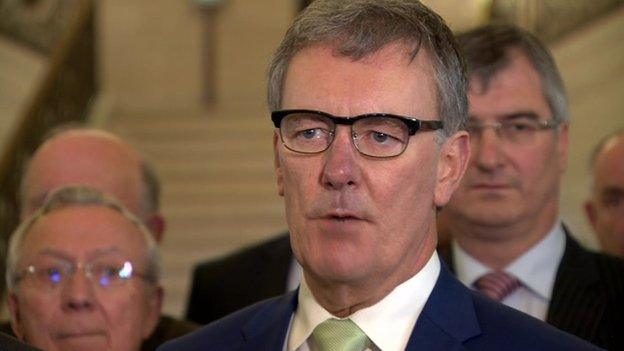Seamus Mallon: 'Mistake' to allow Sinn Féin into government without decommissioning
- Published

A former Stormont deputy first minister has said it was a "fundamental mistake" to allow Sinn Féin into government without decommissioning.
The Good Friday Agreement contained proposals for the decommissioning of paramilitary weapons within two years.
Seamus Mallon said the "mistake" was due to Tony Blair and Bertie Ahern's impatience to get into the history books.
Mr Mallon made his comments in an interview with The Irish Catholic. , external
The Good Friday Agreement in 1998, external was reached after nearly two years of talks and 30 years of conflict, known as the Troubles.
The agreement was seen as a triumph for British Prime Minister Tony Blair and Taoiseach [Irish Prime Minister] Bertie Ahern who had been closely involved in the talks.
Mr Mallon told the newspaper that although the agreement was a "great step forward", it was part of a "flawed process".
'Tarnished'
The former SDLP deputy leader said if the two governments had told Sinn Féin they would not be in government until the IRA got rid of its arms "they would have done it [decommissioned] because they were holding onto the arms as a political weapon".
"The governments' failure was bad tactical politics and devalued and tarnished the agreement and the currency of politics," he said.
During his interview, Mr Mallon returned several times to the failure by the British and Irish governments to insist on decommissioning before Sinn Féin entered government.
"Some people don't realise that two and a bit years before Good Friday, the Provos [Provisional IRA] had already done their negotiations with London and Dublin and with America," he said.
"They had been talking to the British, they had been talking to [John] Hume and had been talking to Dublin and they had been talking to America.
"And they had been laying down their basis for ending [their campaign] before the [Good Friday Agreement] negotiations even started.

Mr Mallon said David Trimble had made a "courageous decision"
"The total fundamental weak part of it was that the governments allowed them [Sinn Féin] to set the agenda."
Mr Mallon said things "could and should have been done differently".
He said the failure of them to deliver had resulted in the "destruction of David Trimble who had made a courageous decision, took enormous abuse and at the end of the day was thrown out of the boat by the two governments when they called the [2003] election."
Crisis
Discussions began last week at Stormont in a bid to resolve the current political row at Stormont.
The crisis was triggered when police said they believed IRA members had been involved in the murder of a former IRA man in Belfast in August.
Chief Constable George Hamilton said the IRA was still in existence, but added that the organisation was not engaged in terrorism.
Sinn Féin said the IRA no longer exists after it ordered an end to its armed campaign in 2005.
The claims by Mr Hamilton led to a breakdown in trust between Sinn Féin and unionist parties.
The Ulster Unionists withdrew from Northern Ireland's ruling executive, with three Democratic Unionist Party (DUP) ministers also later resigning, and DUP leader Peter Robinson stepping aside as first minister.
Unionists agreed to join the talks when the government ordered an independent review of paramilitary groups in Northern Ireland earlier this month.
- Published27 August 2015

- Published26 August 2015

- Published26 August 2015

- Published27 August 2015

- Published27 August 2015
